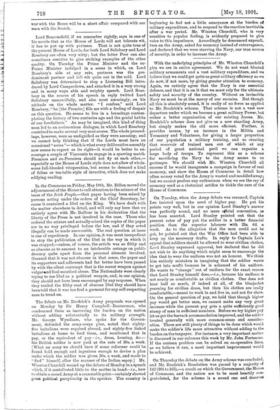With the underlying principles of Mr. Winston Churchill's plea we
are in entire agreement. We do not want bloated military armaments and a vast military expenditure, and we believe that we could get quite as great military efficiency as we do now, if not more, by giving greater attention to economy. Again, we entirely agree that the Navy is our essential defence, and that it is on it that we must rely for the ultimate safety and security of the country. Without an invincible Navy we must be at the mercy of our enemies. But though all this is absolutely sound, it is really of no force as applied to Mr. Brodrick's scheme. That scheme is not a vast new departure under which we become a great military Power, but rather a better organisation of our existing forces. Mr. Brodrick's scheme does not give us a new standing Army, but simply makes the old more efficient. Further, it provides means, by an increase in the Militia and Yeomanry and Volunteers, for giving a larger proportion of our population a military training, and so creating that reservoir of trained men out of which at any period of great national peril we can organise a large body of troops. To represent this as a scheme for sacrificing the Navy to the Army seems to us grotesque. We should wish Mr. Winston Churchill all success if he would inaugurate a campaign in favour of real economy, and show the House of Commons in detail how often money voted for the Army is wasted and muddled away; but we cannot profess any enthusiasm when we see the cry of economy used as a rhetorical artifice to tickle the ears of the House of Commons.






































 Previous page
Previous page